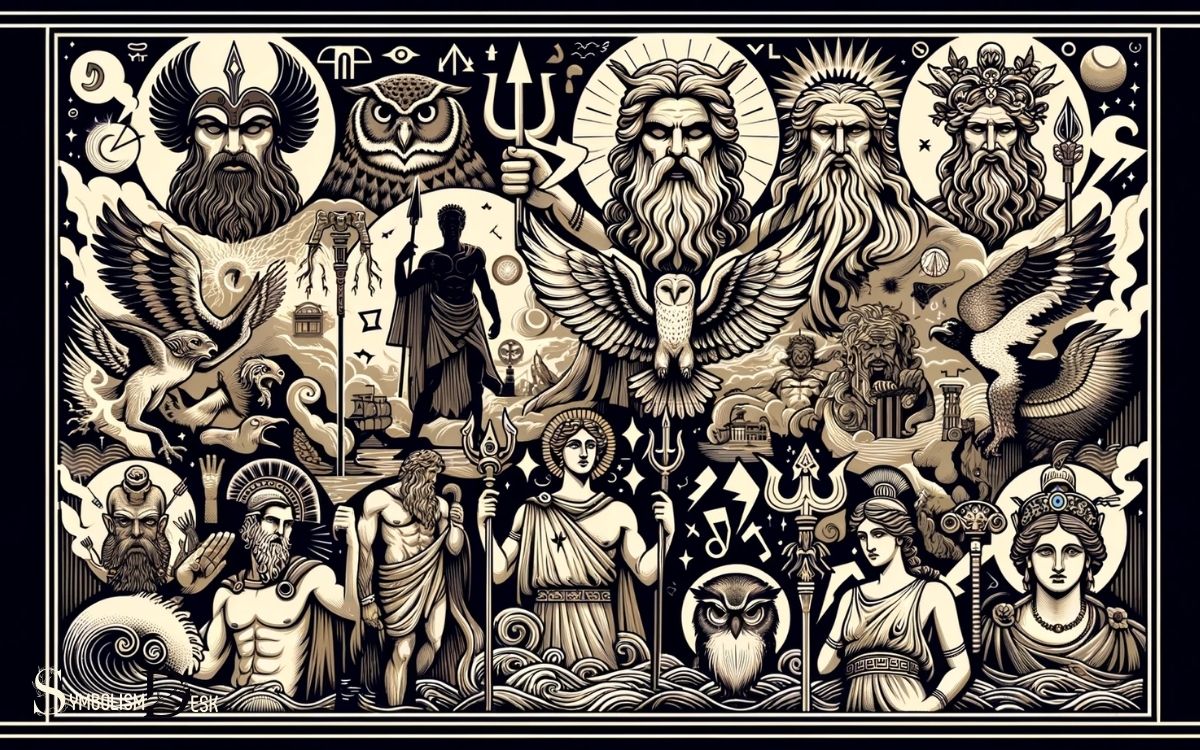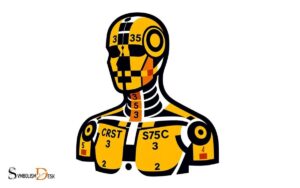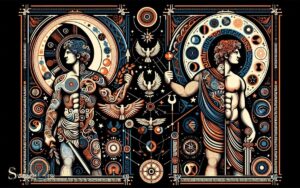Greek Gods and Goddesses Names and Symbols: Poseidon!
The Greek pantheon consists of numerous gods and goddesses, each with distinctive names and symbols that reflect their powers and domains.
Key figures such as Zeus, Athena, Poseidon, Aphrodite, and Hades are central to Greek mythological stories, embodying aspects of the natural world, human experience, and spiritual dimensions.
Their symbols, ranging from lightning bolts to olive trees, tridents, doves, and the helm of darkness, are iconic representations that have transcended time and continue to be recognized today.
Greek mythology is a window into the values and beliefs of ancient Greek culture.
Each deity’s name and associated symbols hold significant meaning:
These symbols were often depicted in art and literature, and their influence persists in modern culture.
Discover the ancient world’s divine icons through the enduring legacy of Greek gods and their emblematic symbols.

Key Takeaway
The Olympian Gods and Their Symbols
The Olympian gods, the 12 principal deities in ancient Greek mythology, each possess distinctive symbols that represent their powers and domains. Zeus, the king of the gods, is often depicted with a lightning bolt, symbolizing his authority over the skies.
Poseidon, the god of the sea, is associated with the trident, representing his dominion over the oceans. Athena, the goddess of wisdom and warfare, is commonly represented with an owl, signifying her wisdom and knowledge.
Similarly, each Olympian deity is linked with specific symbols that serve as an emblem of their unique abilities and responsibilities.
Understanding these symbols provides insight into the characteristics and attributes of each god, enriching the comprehension of their roles in Greek mythology.
The Goddesses of Mount Olympus
Frequently, the goddesses of Mount Olympus are revered for their influential roles in ancient Greek mythology. These powerful and enigmatic figures played significant parts in shaping the Greek mythological world.
Here is a table showcasing some of the prominent goddesses of Mount Olympus and their symbols:
| Goddess | Symbol | Role |
|---|---|---|
| Hera | Peacock feathers | Queen of the gods, marriage, family |
| Athena | Owl | Wisdom, warfare, civilization |
| Aphrodite | Myrtle, dove | Love, beauty, passion |
| Demeter | Cornucopia | Agriculture, fertility, harvest |
| Artemis | Bow and arrow | Hunting, wilderness, childbirth |
These goddesses are celebrated for their unique domains and influence in ancient Greek mythology.
Zeus: King of the Gods
Zeus’ dominion as the king of the gods in ancient Greek mythology is marked by his unparalleled authority and influence over Mount Olympus and the mortal realm. Known as the ruler of the sky and thunder, Zeus is often depicted with a thunderbolt, symbolizing his immense power.
His role as the chief deity is reflected in his responsibility for upholding justice, maintaining order, and overseeing the conduct of both gods and mortals.
Zeus’ iconic eagle and oak tree are emblematic of his supremacy and wisdom. Despite his indisputable sovereignty, Zeus is also characterized by his complex personality, often embodying both benevolence and wrath.
His pivotal position as the king of the gods underscores his significance in the pantheon and his enduring impact on ancient Greek culture and belief systems.
Athena: Goddess of Wisdom and War
Athena, the Goddess of Wisdom and War, is a figure of great significance in Greek mythology. Her symbolic owl represents wisdom and her olive tree symbolizes peace and prosperity.
Additionally, Athena is known for her strategic approach to warfare, making her a revered deity in both intellectual and martial pursuits.
Athena’s Symbolic Owl
The symbolic owl is closely associated with Athena, the Greek goddess of wisdom and war. The owl holds great significance in representing Athena’s character and attributes.
Here are four reasons why the owl is a powerful symbol for Athena:
- Wisdom: The owl is often seen as a symbol of wisdom in various cultures, and its association with Athena emphasizes her role as a wise and knowledgeable deity.
- Intuition: Owls are known for their acute senses and keen intuition, reflecting Athena’s ability to see the truth and perceive beyond the surface.
- Protection: In ancient Greece, owls were believed to protect against harm, mirroring Athena’s role as a guardian and protector of civilization.
- Mystery: Owls are creatures of the night, associated with the unseen and mysterious, aligning with Athena’s enigmatic nature and strategic warfare tactics.
Athena’s Olive Tree
Athena’s association with the olive tree symbolizes peace, wisdom, and prosperity in Greek mythology. The olive tree, a symbol of abundance and fertility, is sacred to Athena and is often depicted in connection with her.
According to myth, Athena won the city of Athens by gifting the olive tree to its people, providing them with olive oil, wood, and food.
This gesture demonstrated her wisdom and peaceful intentions. The olive tree also represents Athena’s strategic warfare, as its wood was used to craft spears and shields.
Below is a table summarizing the significance of Athena’s olive tree:
| Symbol | Meaning |
|---|---|
| Olive Tree | Peace and prosperity |
| Olive Oil | Wisdom and purity |
| Olive Branch | Reconciliation and hope |
| Olive Wreath | Victory and honor |
Athena’s olive tree embodies her multifaceted nature as the goddess of wisdom and war, showcasing her ability to balance intellect with strength.
Athena’s Strategic Warfare
A major aspect of Athena’s character is her strategic prowess in warfare, which complements her role as the goddess of wisdom and war.
Athena’s approach to warfare is marked by wisdom, cunning, and strategic thinking, making her a formidable force on the battlefield.
Her strategic warfare abilities are evident in various myths and legends, showcasing her as a master tactician and a skilled warrior.
Athena’s strategic warfare is characterized by:
- Tactical Brilliance: She excels in devising effective battle strategies that outsmart her opponents.
- Strategic Planning: Athena’s careful planning ensures victory while minimizing risks to her allies.
- Adaptive Leadership: She adapts to changing circumstances and leads her forces with agility and precision.
- Defensive Expertise: Athena’s defensive tactics are unparalleled, ensuring the protection of her allies and their interests.
Poseidon: God of the Sea and Earthquakes
Poseidon, one of the mighty Olympian gods, reigns over the vast and unpredictable seas, wielding immense power over the waves and the creatures that dwell within.
Additionally, he holds dominion over earthquakes, shaping the very earth itself with his force. Recognized by his trident and association with horses, Poseidon’s symbols are deeply intertwined with his authority and influence.
Poseidon’s Domain and Powers
Poseidon’s dominion over the sea and his influence over earthquakes are central to his role as a Greek god. His powers and domain evoke a sense of awe and respect, as they hold immense significance in ancient Greek mythology.
- The vastness of the sea symbolizes Poseidon’s power and authority, inspiring both fear and reverence.
- The unpredictability of earthquakes underscores Poseidon’s ability to disrupt the earth, instilling a sense of awe and wonder.
- The sea’s beauty and ferocity reflect Poseidon’s complex and multifaceted nature, evoking a deep sense of respect.
- The symbolism of water as a life-giving force underscores Poseidon’s role in both creation and destruction, eliciting a profound emotional response.
Poseidon’s domain and powers encapsulate the enigmatic and formidable nature of this ancient Greek deity.
Symbols Associated With Poseidon
Evidently, Poseidon’s symbols play a significant role in depicting his influence as the god of the sea and earthquakes.
Frequently, these symbols are deeply intertwined with the natural elements, representing his enduring power and authority in Greek mythology.
The trident is the most renowned symbol of Poseidon, symbolizing his dominion over the sea. Often depicted as a three-pronged spear, it also represents his ability to cause earthquakes, as he could strike the ground with it to create tremors.
Horses are another symbol associated with Poseidon, particularly with their connection to the sea. Moreover, dolphins are considered sacred to Poseidon and are associated with protection and guidance.
These symbols collectively capture the essence of Poseidon’s influence over the natural world and his role as a powerful and sometimes unpredictable deity.
Aphrodite: Goddess of Love and Beauty
Aphrodite, the Greek goddess of love and beauty, is a prominent figure in Greek mythology, revered for her unparalleled beauty and ability to inspire love and passion. Her influence and significance are evident in various aspects of Greek culture.
Embodying the essence of love and beauty, Aphrodite captivates the imagination and emotions of those who explore her mythology.
Her story evokes a range of feelings, including:
- Admiration for her ethereal beauty and grace.
- Fascination with her ability to ignite passionate love.
- Intrigue about the complexities of romantic relationships, as depicted in her myths.
- Inspiration to seek and appreciate beauty and love in all aspects of life.
Aphrodite’s enduring presence in Greek mythology continues to captivate and enchant audiences, leaving an indelible mark on the human understanding of love and beauty.
Hades: Ruler of the Underworld
Hades, the ruler of the Underworld in Greek mythology, holds a position of immense power and authority within the pantheon of gods and goddesses.
As the eldest son of Cronus and Rhea, Hades was swallowed by his father at birth and later freed by Zeus, aiding in the overthrow of the Titans. His realm is a place of darkness and finality, where the souls of the deceased reside.
| Symbols | Attributes |
|---|---|
| Helmet | Invisibility |
| Key | Control |
| Cerberus | Guard dog |
Hades is often depicted with his three-headed guard dog, Cerberus, and is associated with the helmet of invisibility and the key to the Underworld. Despite being feared, Hades is not malicious; instead, he is a stern but fair ruler, maintaining balance in the afterlife.
Conclusion
The symbols associated with the Greek gods and goddesses reflect their powers and domains. These deities held great significance in ancient Greek mythology and were revered and feared by mortals.
The intricate relationships and dynamics among the gods and goddesses shaped the stories and beliefs of the ancient Greeks, illustrating the complexity of human emotions and the natural world. Their enduring legacy continues to captivate and inspire people around the world today.






